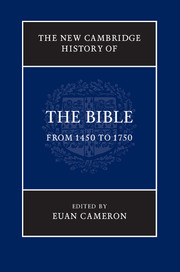Book contents
- Frontmatter
- Contents
- List of figures
- List of contributors
- Preface
- List of abbreviations
- Introduction
- PART I RETRIEVING AND EDITING THE TEXT IN EARLY MODERN EUROPE
- PART II PRODUCING AND DISSEMINATING THE BIBLE IN TRANSLATION
- PART III PROCESSING THE BIBLE: COMMENTARY, CATECHESIS, LITURGY
- PART IV THE BIBLE IN THE BROADER CULTURE
- 25 The Bible in political thought and political debates, c. 1500–1750
- 26 The problem of ‘spiritual discipline’: Apocryphal books among sixteenth-century leaders of the Lutheran churches
- 27 The Bible and the emerging ‘scientific’ world-view
- 28 Between humanism and Enlightenment: Morality, reason and history as factors in biblical interpretation
- 29 The Bible and the early modern sense of history
- 30 The Bible and literature in the European Renaissance
- 31 The Bible and the visual arts in early modern Europe
- 32 The Bible and music in the early modern period (1450–1750)
- PART V BEYOND EUROPE
- Afterword
- Select bibliography
- Select Bible bibliography
- Index
32 - The Bible and music in the early modern period (1450–1750)
from PART IV - THE BIBLE IN THE BROADER CULTURE
Published online by Cambridge University Press: 05 August 2016
- Frontmatter
- Contents
- List of figures
- List of contributors
- Preface
- List of abbreviations
- Introduction
- PART I RETRIEVING AND EDITING THE TEXT IN EARLY MODERN EUROPE
- PART II PRODUCING AND DISSEMINATING THE BIBLE IN TRANSLATION
- PART III PROCESSING THE BIBLE: COMMENTARY, CATECHESIS, LITURGY
- PART IV THE BIBLE IN THE BROADER CULTURE
- 25 The Bible in political thought and political debates, c. 1500–1750
- 26 The problem of ‘spiritual discipline’: Apocryphal books among sixteenth-century leaders of the Lutheran churches
- 27 The Bible and the emerging ‘scientific’ world-view
- 28 Between humanism and Enlightenment: Morality, reason and history as factors in biblical interpretation
- 29 The Bible and the early modern sense of history
- 30 The Bible and literature in the European Renaissance
- 31 The Bible and the visual arts in early modern Europe
- 32 The Bible and music in the early modern period (1450–1750)
- PART V BEYOND EUROPE
- Afterword
- Select bibliography
- Select Bible bibliography
- Index
Summary
The Bible is no doubt the single most important source for texts in the music of the early modern period. Liturgical music was of course based on biblical texts, but compositions that can be classified as texts of domestic devotion also refer to the words of both Old and New Testaments. Because of the similarities in these two types of text it can be quite difficult to determine with any certainty whether a specific piece is derived from a liturgical or non-liturgical source. It is also beyond the scope of this overview to examine in detail all of the different ways in which biblical texts were used in music, and the ways in which music was used to interpret biblical texts. The amount of material available is simply too great. The approach in this study is therefore to illustrate the main trends by means of a series of representative case studies.
It is important to remember that music, like any art form, has its own inherent rules which are manifest on a syntactic level (harmony, melody) and also in the way that various genres are used. Theological history and musical history do not always develop in the same direction, and great caution should be exercised when making theological interpretations of musical works. Sometimes composers respond to theological shifts and sometimes, as in the case of the oratorio of the Counter-Reformation, religious music selects and adapts ideas that have already become established in secular music, such as those found in opera, for example.
An important question in the study of the relationship between music and the Bible is what exactly music contributes beyond a simple presentation of the text. To what extent does music add some kind of extra ‘value’ when biblical texts are reproduced? Music can highlight particular sections, or even individual words, and thereby add an emphasis which in itself is a type of interpretation. Music can also add emotional content to a text, as for example when the emotions contained in the words, such as joy, sadness etc., are amplified in the music. It is also possible to have a dialectical opposition between the music and the text, with the result that the music challenges or ironises the text.
- Type
- Chapter
- Information
- The New Cambridge History of the Bible , pp. 762 - 802Publisher: Cambridge University PressPrint publication year: 2016



